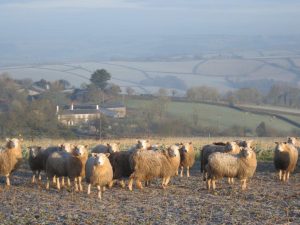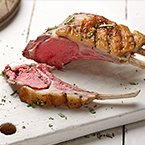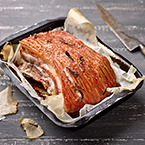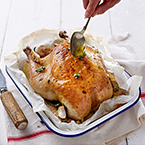Farmer Tim Budden of Higher Hacknell Organic Farm reflects on Brexit
by Sustainable Food Trust on 30 November, 2018 in Farming, Food Policy
What next for British agriculture: Farmers and food businesses reflect on Brexit
With only a few months remaining before our scheduled departure from the European Union, Brexit is looming large on the horizon. As talk of transition, hard borders and ‘no-deal’ spreads, we wanted to find out how farmers and food businesses across the country were feeling about the future of UK agriculture. What threats and opportunities do they see? Has their perspective changed since 2016? What specific issues are their businesses facing, and what has the UK Government done to address those concerns? We’ve invited farmers across the UK, to share their thoughts.
This week, we speak to Tim Budden of Higher Hacknell Organic Farm in North Devon, nestled between Dartmoor and Exmoor. Since 1988, Tim and his wife Jo have been farming cattle, sheep, crops and a cider orchard organically. The 350 acres are mostly grassland, a combination of permanent pasture and lush clover leys, upon which they rear their livestock. Tim and Jo farm in a traditional way, using rotational methods to prevent pests and disease and provide a clean, healthy system which avoids the use of agrochemicals and antibiotics. Their animals are slaughtered at a local abattoir and in 2004 they built a butchery, providing them with complete supervision over the process of rearing and processing to improve provenance.
“My biggest concerns about Brexit and its effects on agriculture in the UK are for the environment, mixed family farms and local food. Whether or not the UK Government is prepared to support British farmers when we leave the EU is a serious concern. Unfortunately, the UK is largely an urban society that seems to understand less and less about rural issues. The value of local, sustainable unprocessed food has been devalued. Consequently, our land, the farmers and their value to the wider economy is not appreciated. Lobbying by NFU and large land-owners on one side, and well-funded conservation bodies on the other, creates a vacuum for the yeoman farmer in the middle. For many years we have talked about ‘efficiency’ and ‘economies of scale’, and yet it’s the largest farms we support with the most subsidy.
 Future trade deals that sacrifice UK farmers who farm to higher standards are particularly worrying and could represent a backward step for animal welfare. Cheap imports produced to low standards, will put UK farmers out of business. Whist we have heard about the good intentions of Government to support sustainable farming and wildlife, when we leave the EU, pressure from other areas of government such as health, education and trade – which historically take precedence – is likely to mean British farmers have to take a back seat.
Future trade deals that sacrifice UK farmers who farm to higher standards are particularly worrying and could represent a backward step for animal welfare. Cheap imports produced to low standards, will put UK farmers out of business. Whist we have heard about the good intentions of Government to support sustainable farming and wildlife, when we leave the EU, pressure from other areas of government such as health, education and trade – which historically take precedence – is likely to mean British farmers have to take a back seat.
We are preparing for this – just as we have faced many threats over the years – by direct marketing and low-input farming. Further, when consumers become concerned about lower food standards, organic certification is a valuable asset.
My priority for future UK farm policy is the importance and interconnection of food, environment and culture to which the farmer is central. Past policy has seen the demise of millions of farmers and we are now becoming as scarce in society as the wildlife that is so lacking in our arable fields. Many well-intentioned people quite rightly see the rise of factory farming and meat consumption as bad. Yet much of their diet is imported from less than desirable farming systems, on the other side of the world. Negative press towards meat production may mean that people move away from largely grass-fed red meat and opt for fish and chicken which have higher environmental costs. This hugely effects UK farming and smaller family farms that tend to be more livestock-based and mixed. It’s these farms that are in need of support.
There are huge opportunities to get agriculture right with Brexit. I have always believed in the ‘small is beautiful’ maxim. There is now potential for more regional projects and UK-specific issues to be addressed, as for instance, increasing the quantity of home-grown fruit and vegetables which are currently imported. This could be helped by putting caps on payments to large and potentially polluting holdings and weighted towards smaller units that produce healthy sustainable food and are carbon friendly. It is beholden on Government to provide healthy food with a low carbon footprint and a thriving environment both for wildlife and people.
Sustainable Food Trust’s response
We applaud Tim for pointing out the growing tension around red meat consumption. Our supporters will know that we have long advocated for greater nuance in the vegan/vegetarian debate, focused around lowering and ultimately eliminating meat consumption. We encourage stakeholders to differentiate between industrially-produced livestock that are part of the problem, and pasture-fed livestock that are part of the solution. Two-thirds of UK farmland is under grass, mostly for sound environmental reasons, and it provides a major carbon store and one of our most important food-producing resources. Ploughing large areas of pasture to grow crops would add to, rather than reduce, climate change.
Additionally, we think that there is a real problem with the blanket use of the term, ‘red meat’, which is freely used but flawed. Firstly, it is frequently used to refer to all ruminant meat, meat from pigs and all processed red meats. This is misleading because each type of meat (pork, lamb, beef) is produced in very different ways with very different impacts on the environment and on public health. Secondly, the term fails to differentiate between methods of production even within one type of meat. The environmental footprint of an industrially-produced hamburger will have a very different footprint to that of an organic one. Similarly, an American concentrated feedlot with 12,000 head of cattle has a significantly different environmental impact than a small herd of grass-fed cows produced in an agroecological manner. Consequently, the term ‘red meat’ is intellectually sloppy and creates confusion.





